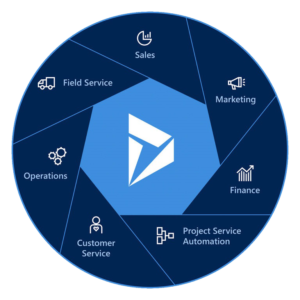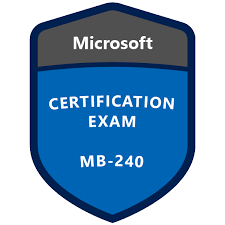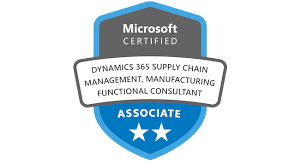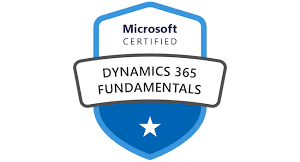Audience
Consultants (functional and technical) gather and analyze business requirements and translate those requirements into fully realized business processes and solutions that implement industry recommended practices. They serve as a key resource in implementing and configuring apps to meet business requirements. Consultants should be able to implement core components and features of Dynamics 365 Finance and Operations apps. They should also have awareness of how Dynamics 365 Finance and Operations apps integrate with external systems and tools including Power Platform. The consultant uses Lifecycle Services (LCS), Azure DevOps, and other Microsoft tools and platforms to facilitate the application lifecycle management (ALM) process.
Prerequisites
Knowledge and use of:
• Office 365 and Dynamics 365
Skills Gained
After completing this course, participants will be able to:
• Describe finance and operations apps, and extend apps by using Microsoft Power Platform technologies
• Configure administrative features and workflows
• Manage finance and operations data
• Validate and support solutions
Course outline
Module 1: Use common functionality and implementation tools
In this module, you will learn to get an introduction to Dynamics 365 Finance and Operations by learning Basic UI and Navigation. Students will also work with Power Platform tools that work with Finance and Operations apps.
Lessons
• Introduction
• Introduction to Dynamics 365 Finance and Operations
• Basic UI and Navigation
• Dynamics 365 Finance & Operations Features and Functionality
• Power Platform tools that work with Finance and Operations apps
• Module Summary
Lab: Work with operational workspaces
Lab: Perform Searches and Work with Filters
Lab: Create search queries and save for future use
Lab: Work with record templates
Lab: Prepare, enable, and use business document management
Lab: Work with Saved Views
Lab: Setup Number Sequences
Lab: Configuring Address Books
Lab: Work with Operational Workspaces
You have learned how to:
• Use common functionality and implementation tools.
• Describe use cases for, and capabilities of, workspaces.
• Use and personalize operational workspaces.
• Describe case management.
• Describe global address book features and their use cases.
• Identify the inquiry and report types available in a default installation.
• Describe use cases for the business document management and electronic reporting features.
• Navigate and efficiently use search filtering and create search queries.
• Understand and use record templates.
• The Finance and Operations apps available for different business processes
• Describe use cases for Power Platform apps and services.
• Integrate Power BI with Dynamics 365 Dynamics 365 Finance apps.
Module 2: Configure administrative features and workflows
In this module, you will learn how to Implement Security in Finance and Operations Apps while also implementing workflows and business events. Students will Administer Finance and Operations Apps and implement reporting.
Lessons
• Introduction
• Implementing Security in Finance and Operations Apps
• Implementing Dynamics 365 Finance and Operations apps workflows and business events
• Planning and implementing an organization in Dynamics 365 Finance and Operations
• Administering Finance and Operations Apps
• Implement Reporting in Dynamics 365 Finance and Operations
• Module Summary
Lab: Create a Batch job
Lab: Create an organization hierarchy
Lab: Create an operating unit
Lab: Configure a new legal entity
Lab: Create a purchase requisition workflow
Lab: Run a security report and analyze the outputs
Lab: Set up segregation of duties
Lab: Create users and assign security roles
You have learned how to:
• Implement security and segregation of duties
• Design and create workflows
• Set up and configure legal entities and operating units
• Creating Batch Jobs
• Create an organization hierarchy and assign purpose
• Configure user options
• Use Excel Workbook Designer
• Configure email (SMTP/Exchange)
• Create and maintain email templates
• Use Power Automate flows from Dynamics 365 Finance and Operations
Module 3: Manage Dynamics 365 Finance and Operation data
In this module, you will learn how to Manage Finance and Operations data by planning for Data Migrations and work with apps with integrate with Finance and Operations apps.
Lessons
• Introduction
• Manage data in Dynamics 365 Finance and Operations apps
• Plan for Data Migration
• Introduction to AppSource and ISV solutions
• Dynamics 365 Finance and Operations integration
• Module Summary
Lab: Work with templates in the Data management workspace
Lab: Export and import data
Lab: Copy configuration data between legal entities
Lab: Use the Excel Workbook designer
In this module, you learned how to:
• Describe Data management concepts.
• Configuration data templates.
• Identify relevant data entities and elements based on given scenarios.
• Describe use cases for and types of data entities.
• Create a template by using the Excel Workbook Designer.
• Describe use cases for the dual-write feature.
• Discuss how to prepare data for import or create all necessary startup data.
• Import or export data by using the data management framework.
• Copy configuration data between companies or legal entities by using the data management framework.
• Dynamics 365 Finance and Operations integration.
Module 4: Validate and support the solution
In this module, you will learn how to manage applications and test solutions in Dynamics 365 Finance and Operations and Implement Lifecycle services (LCS) Tools.
Lessons
• Introduction
• Managing Applications in Dynamics 365 Finance and Operations
• Implement Lifecycle Services (LCS) tools
• Testing solutions in Dynamics 365 Finance and Operations apps
• Module Summary
In this module, you learned how to:
• Document gaps between existing and desired functionality
• Determine when to build versus buy
• Go live process and Fast-Track Go-live processes
• LCS Tools and Methodologies
• Business Process Modeler in LCS
• LCS Search and Service Requests
• Diagnostics and environment monitoring tools
• BPM Libraries overview
• Test cases by using Regression Suite Automation Tool (RSAT) and Azure DevOps.
• Analyzing performance with trace parser
Schedule
Click on the following link to see the Current Course Schedule
Our minimum class-size is 3 for this course.
If there are no scheduled dates for this course, it can be customized to suit the time and skill needs of clients and it can be held online, at a rented location or at your premises.
Click on the following link below to arrange for a custom course: Enquire about a course date







